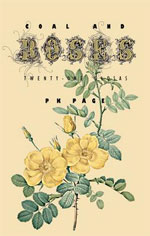
P.K. Page took on the stylistically challenging formal glosa form for each poem in Coal and Roses, which was to become her last poetry collection before her death in January, 2010 at the age of 93. As described at the opening of the book:
The glosa form opens with a quatrain, borrowed from another poet, that is then followed by four ten-line stanzas terminating with the lines of the initial passage in consecutive order. The sixth and ninth lines rhyme with the borrowed tenth. Glosas were popular in the fourteenth and early fifteenth centuries among poets attached to the Spanish court.
That Page would tackle such a labyrinthine approach to poetic expression when others would be long retired from their chosen career or metier attests to her abiding intellectual curiosity and enthusiasm for her craft. That she could apply a form that perhaps sounds fusty and overly complex to fresh subject matter, in varied and lively styles, exploring a range of traditions, is revelatory. That she could take as her inspirations and starting points such diverse poetic voices as Margaret Cavendish, Ted Hughes, Don McKay, Gwendolyn MacEwen, Jorge Luis Borges, Dionne Brand, Anna Akhmatova and more is breathtaking, offering a vibrant primer for those wishing to expand their poetic education and horizons. That this collection could go on to share the Griffin Poetry Prize shortlist with Kate Hall, a young poet who was once mentored by Page, is a gorgeously bittersweet tribute to a respected literary grande dame.
The stunning beautiful Coal and Roses by P.K. Page is a gift to all poetry lovers, a testament to the life of an extraordinary and generous artist, and an essential literary work.
